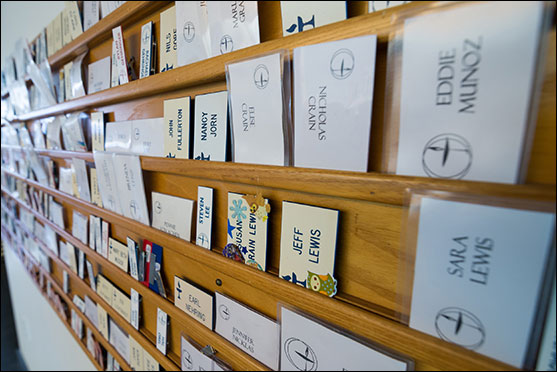
80 congregations now hire membership professionals
Most UUA growth last year happened in congregations with paid membership coordinators.
Hiring a professional membership staffer is key, according to a new organization, the Unitarian Universalist Association of Membership Professionals (UUAMP), which points to growing membership among those congregations with a professional to support the claim.
Last year, about 2,000 new members formally joined UU congregations in the United States. Almost all of that growth occurred in congregations that employ a membership professional, said the Rev. Tandi Rogers, the Unitarian Universalist Association’s innovation and network specialist and its liaison with UUAMP. While UUA membership data is still being analyzed, Rogers, for one, believes that professionalizing membership duties clearly is an effective tool for congregations that want to grow, and she said she is very impressed with the work of UUAMP.
“A lot of people join a church and then fade away. A membership professional can pay attention to them, help keep them engaged, and hopefully increase longevity,” said Lori Emison Clair, one of the founding members of UUAMP and director of congregational life at First Unitarian Church of Des Moines, Iowa, a growing congregation of over 500 members. “It leads to growth in your congregation, not just numerical, but growth of depth in terms of levels of commitment.”
Growing the faith is a top priority for most Unitarian Universalist congregations, and a major goal for the UUA, as voiced by President Peter Morales. UUAMP believes one key is for congregations to hire a part- or full-time professional trained in building relationships with newcomers so that they become more fully engaged with their congregation.
Successfully attracting and retaining members involves three steps, Clair said:
- Connecting with new members;
- Engaging them in an ongoing commitment with the church; and
- Integrating them into leadership positions where they have an impact on the congregation.
“Where a congregation only has a layperson, it’s hard to move people through those steps,” Clair said. “They don’t have time to focus on it, to build relationships, to know when someone is ready to go from being a newbie to being a pillar of the congregation.”
Formally launched in 2011, UUAMP offers resources, training, and other support for membership professionals. It hosts informational webinars, has a book group that discusses materials about how to grow membership, and serves as a clearinghouse for other information. At the 2014 UUA General Assembly in Providence, R.I., the organization presented its first GA workshop, “Igniting Growth through Professional Membership Ministry,” in which it introduced its new manual on best practices in hiring a membership professional. The presentation attracted a standing-room-only crowd of over 100 people.
In May, the organization received an $8,000 grant from the UU Funding Program to create a formal certification process for its members, which it will develop over the next year by reviewing the model of the Liberal Religious Educators Association and other UUA-affiliated groups. UUAMP’s website includes hiring guidelines for congregations seeking to employ a membership professional, and the organization is also working with UUA staff to modify fair compensation guidelines for membership professionals to address full- and part-time positions and different types of duties.
“Many congregations start with a membership professional who’s there 10 hours a week, or 20, and then we see a lot of large congregations with a full-time person,” said Clair. “We think that one [compensation] category doesn’t represent that spectrum.”
UUAMP currently has 80 members who are paid for their membership duties, but the organization’s resources and general support are open to UUs doing membership work on a volunteer basis, too. “We want everyone who is doing something in this role to join us,” said Marie Blohowiak, congregational life coordinator at Fox Valley Unitarian Universalist Fellowship in Appleton, Wisc., another founding member of UUAMP.
UUAMP grew out of a small, informal group of membership professionals who met infrequently under the auspices of the Association of Unitarian Universalist Administrators (AUUA). But they felt that membership should be a core function handled by a trained professional rather than something relegated to an administrative assistant or volunteers.
“We really needed to have one place to share ideas and resources,” said Blohowiak, who has been a membership professional for nine years. And while its members needn’t be ministers—in fact, most are not—they nonetheless see their work as a ministry essential to every congregation. “It’s a ministry of relationship building,” said Clair.
In 2010, a core group including Clair and Blohowiak formed a steering committee that came up with a name, logo, and mission statement; negotiated a financial sponsorship with Tim Brennan, UUA treasurer and CFO; and set about coming up with professional standards for its members. A year later, UUAMP was formally recognized by the UUA, and that year it presented its first professional program at the Large Church Conference in Minneapolis.
In addition to designing the certification process, its goals this year include growing its own membership and increasing visibility within the UUA and UU congregations.
Photograph (above): A name tag rack at the Unitarian Universalist Fellowship of Lawrence, Kans. (© Colin Macmillan). See sidebar for links to related resources.
Comments powered by Disqus






